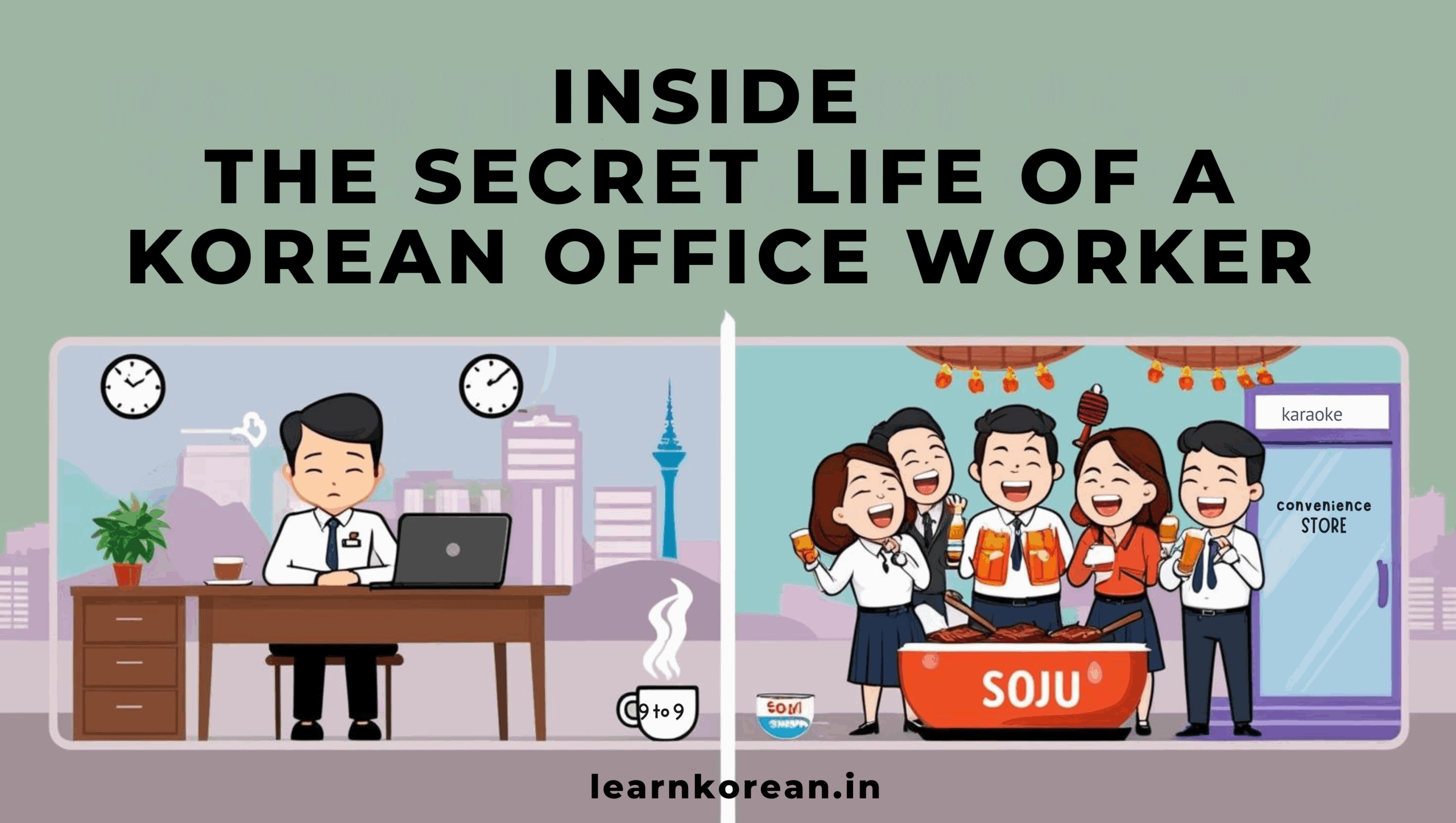
We’ve all seen it in K-dramas – the sharply dressed employee rushing through Seoul’s busy streets, coffee in one hand, documents in another, bowing endlessly to seniors. But what’s real and what’s just for drama?
Let’s take a deep dive into the secret life of a Korean office worker – the routine, the pressure, the respect culture, and even the unexpected bits of joy. For Indian learners and K-culture fans, this will give you both a reality check and some relatable moments!
1. The 9-to-9 Life (Not 9-to-5!)

The typical Korean workday officially starts at 9:00 AM and ends at 6:00 PM. But in reality? Many employees don’t leave before 8 or 9 PM. Why? Because of an unspoken rule: You can’t go home before your boss does.
Even if you finish your work on time, it’s common to stay late to “show dedication.” This is part of the “nunchi” culture, where reading the room and understanding social expectations is very important.
Indian Vibe Check:
In Indian IT and startup culture, something similar happens. Many employees stay longer just to avoid looking like the “lazy one.”
2. Hierarchy is Everything (Say Hello to Sunbae Culture!)

In Korean offices, hierarchy isn’t just about job titles – it also includes age, experience, and entry year. This is known as Sunbae-Hoobae culture (Senior-Junior). You speak differently, bow lower, and even pour drinks a certain way for someone older or more experienced.
You’ll often hear terms like:
- 팀장님 (Timjang-nim) – Team leader
- 과장님 (Gwa-jang-nim) – Section Chief
- 사장님 (Sajang-nim) – Company President
The honorific -nim is added to show deep respect.
Indian Parallel:
Think of how we still say “Sir” and “Ma’am” even to colleagues in higher roles. Respect for hierarchy is something both cultures strongly share.
3. Team Dinners (회식 – Hweshik): Mandatory Fun?

Hweshik is a company dinner where teams go out together after work – usually involving barbecue, beer, and soju. It sounds fun, right? But here’s the twist: You can’t say no.
Even if you’re tired or have personal plans, skipping a hweshik can be seen as anti-social or disrespectful. And guess what? There could be multiple rounds — dinner, then drinks, then karaoke, then… who knows?
Relatable?
In India, we also have informal office parties or chai sessions where showing up helps with bonding and future promotions. Same same, but soju.
4. Coffee = Office Lifeline

In Korean offices, coffee breaks are sacred. Whether it’s instant coffee from a machine, or a café latte from the convenience store downstairs, workers survive on caffeine.
Many companies even have in-house coffee bars or team “coffee runs,” where someone is sent to grab drinks for everyone (usually the youngest team member!).
5. Dress Code: Formal, Stylish, Always On Point

Korean office workers dress very smartly. Suits, neat hairstyles, polished shoes — everything is about presentation. Casual Friday? Doesn’t exist in most places.
K-drama is accurate here! What you see in shows like What's Wrong with Secretary Kim or Misaeng is actually how people dress and behave.
Tip for Future Interns/Workers:
When in doubt, always overdress rather than underdress in a Korean office.
6. Break Time = Power Nap or Convenience Store Escape

Lunch breaks usually last an hour, and it’s common for workers to grab food quickly and take a short nap at their desk. Yup – sleeping at work is acceptable in Korea, as long as your work is done.
Some head to the nearest 편의점 (pyeonuijeom) – convenience store – for snacks, drinks, or just to mentally escape.
Indian Style:
We take chai breaks, they take ramen-and-nap breaks. Both recharge the soul!
7. Promotions = Patience + Loyalty

Promotions in Korean companies don’t come quickly. Unlike in some Indian startups or MNCs, where you might get promoted in a year or two, in Korea it often takes years of loyal service, especially in traditional companies like Samsung or Hyundai.
It’s less about skill alone and more about seniority, company loyalty, and relationships.
Being a Korean office worker is a mix of stress, hierarchy, and unexpected bonding. It might look intense from the outside, but for many Koreans, it’s also where they build lifelong friendships, discover hidden talents at karaoke nights, and learn the art of teamwork.
So next time you see a K-drama character sighing at their desk — trust us, it’s not just for the script. That’s real life.
And hey, if you ever end up working in Korea, make sure you brush up your bowing skills, learn to pour soju the proper way, and get ready to master the art of nunchi. Who knows, you might even start enjoying those late-night convenience store ramen cups!

